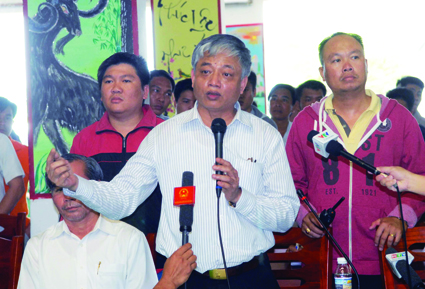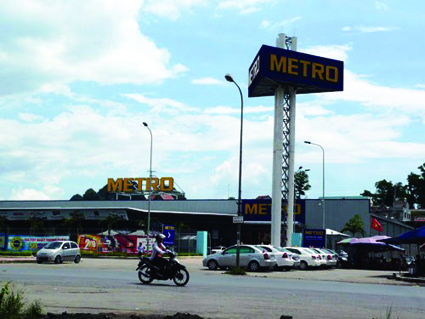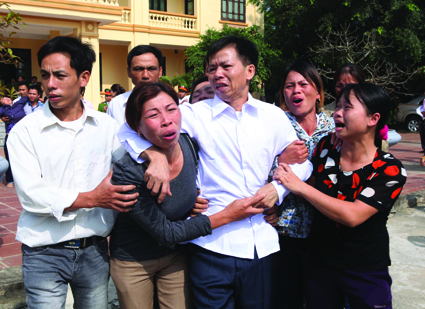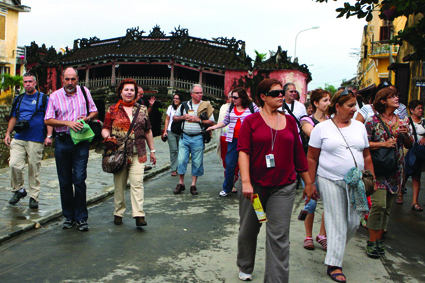After 30 years of renewal, the economy of Vietnam operating under the socialist-oriented market mechanism has emerged from ages of stagnancy but this economic model still needs a uniform perception.
The socialist-oriented market economy in Vietnam is a type of organization of the economy based on not only the principles and rules of a market economy but also the principles and charateristics of socialism shown in three aspects: ownership, organization of management and distribution. It is an organized market economy led by the Party and administered by the socialist state, which is socially oriented to minimize defects of the market in order to best serve the interests of the majority of people and the sustainable development of the country.
 |
Son La province’s Moc Suong farm workers pick Kim Tuyen tea leaves for export to Taiwan__Photo: Dieu Chinh Toi/VNA |
To unify and simplify the concept of socialist-oriented market economy, the draft Political Report prepared by the Party Central Committee (the 11th Tenure) for the upcoming 12th Party Congress has recently introduced a new definition of socialist-oriented market economy. It is “an economy operating fully and synchronously according to the rules of a market economy while ensuring the socialist orientation suitable to each period of national development. It is a modern and internationally integrated market economy which is administered by a law-ruled socialist state and led by the Communist Party of Vietnam toward the goal of a rich people and a developed, democratic, equal and civilized country.”
The draft report goes on to say that the socialist-oriented market economy of Vietnam has advanced production relations corresponding to the development level of production forces; and has different forms of ownership and multiple economic sectors of which the state sector plays the leading role and the private sector is an important driving force of the economy. Stakeholders of different economic sectors are equal, cooperative and competitive under law. The market plays the essential role in effectively mobilizing and distributing resources for development and is the major motive to liberalize the production capacity. Resources are distributed by the State under strategies, master plans and plans in conformity with the market mechanism.
The draft document stresses the State plays the role of orienting, building and completing economic institutions and creating an environment for fair, transparent and healthy competition; using its resources, instruments and policies to orient and regulate the economy, boost production and business and protect the environment; and ensuring social progress and equality in each development step and policy. The role of the people as masters is promoted in socio-economic development.
It also sets goals and tasks to develop the socialist-oriented market economy in the next five years, which are to strive by 2020 to basically complete a synchronous system of institutions of the socialist-oriented market economy up to the universal standards of a modern and internationally integrated economy; to ensure uniformity between economic and political institutions and between the State and the market; to ensure harmony between economic growth and cultural and human development, social progress and equality, social security, environmental protection and sustainable social development; to proactively integrate into the global economy associated with building an independent and self-reliant economy; to ensure publicity, transparency and forecasting ability in the formation and implementation of economic institutions, creating stable and favorable conditions for socio-economic development.
Addressing a seminar on perception about socialist-oriented market economy in Hanoi last month, Dr. Nguyen Xuan Thang, chairman of the Vietnam Academy of Social Sciences said that 30 years of national renewal is a powerful evidence of using the market economy as a tool in building socialism.
The country’s renewal in the past years have brought about high and stable economic growth, impressive and sustainable reduction of poverty and remarkable improvement of the people’s material and spiritual lives.
The country have escaped from its social and economic crisis and state of underdevelopment, becoming an average-income country with socio-political stability and increased defense and security. Foreign relations have been expanded as the position of Vietnam has been heightened in the international arena.
Institutions of the socialist-oriented market economy, particularly the legal system, have been further improved. The role, effectiveness and competitiveness of economic entities and businesses have been increased. The investment and business environment has been improved, becoming fairer and more open. Market elements and types of markets have been formed more synchronously, operating smoothly in connection with regional and international markets. Prices of most commodities have been set by market economy principles.
The role of the State has been adjusted in tune with the market mechanism with increased democracy in the social and economic life. The mobilization and distribution of resources under socio-economic development strategies, master plans and plans have step by step matched the market mechanism, and business monopoly restricted and controlled. The economy has deeply and widely integrated into the world economy at different levels and in diversified forms, step by step adhering to the principles and standards of the global market.
The market economy and socialist orientation should be now defined specifically rather than generally, Prime Minister Nguyen Tan Dung told the February cabinet meeting, stressing a market economy must completely follow its rules, first of all in terms of prices and resource distribution, and ensure publicity, transparency and fairness.
He said the market mechanism or autonomy of public non-business units in such sectors as health and education did not mean overlooking the poor, stressing it was the time to change such way of thinking. In other words, social welfare should be separated from production and business.
The cabinet leader said the socialist orientation meant the State used its policies, instruments and resources for regulation, distribution and redistribution to ensure social progress and equality and poverty reduction, citing for example in the health sector the State would offer the poor and other policy beneficiaries separate preferential policies while healthcare services should be fully and properly charged. The Government would now no longer keep low prices or offer price subsidies to ensure social security as policy beneficiaries would receive direct support from the State, the Prime Minister said, adding the socialist orientation meant the people all enjoy basic social services rather than hospitals or schools are state-owned or private.
Sharing this view, Dr. Nguyen Quang Thai, deputy general secretary of the Vietnam Economic Science Association insisted that a market economy must be a true one to enable Vietnam to successfully integrate into the world economy and increase its competitiveness.
Dr. Thai pointed out the economy’s full operation under the market mechanism would help develop the country and increase its competitiveness - a prerequisite for equal distribution and redistribution and support for the poor and the disadvantaged. He told the Tien Phong (Vanguard) online that the socialist orientation should not be understood as equal division right at the early stage of development, saying at this stage, distribution must be based on contribution of labor, grey matter and property of each person. Only on the foundation of a developed economy that redistribution and social policies could be implemented to help people have better and equal living conditions. He pointed out the State’s important function was to build better spiritual and material lives of the people in the context of international integration.
He also said development strategies, plans and policies adopted might be improper or impractical so it was the responsibility of management authorities, the society and every citizen to supervise and detect any errors to help the State make appropriate adjustments through economic instruments and policies and resources.
The idea of a socialist-oriented market economy was first touched up at the 6th Party Congress in 1986 which set out the policy to build up a multiple-sector economy in order to develop production forces. This policy had been improved in the subsequent congresses. The resolution of the 7th National Party Congress pointed out “to consistently implement the policy on multiple economic sectors with the socialist orientation” and identified “five economic sectors in the country, namely the state, collective, individual, private capitalist and state capitalist sectors.” The 8th Congress came up with the policy to “build a multiple-sector commodity economy which operates under the market mechanism in combination with enhancing the management role of the State under the socialist orientation.” The 9th Congress officially introduced the concept of socialist-oriented market economy which is the general economic model throughout the transition to socialism in Vietnam, affirming that development of the socialist-oriented market economy is a consistent strategic policy.- (VLLF)








